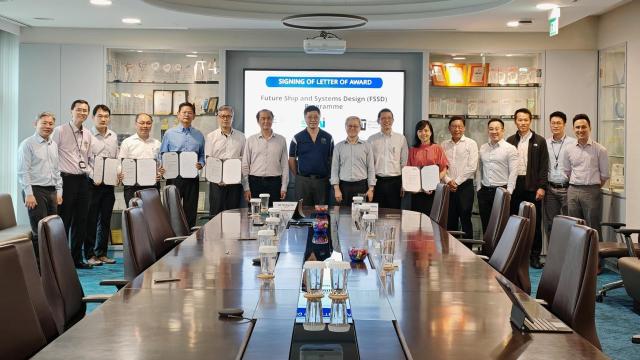 In the 1950s, computerisation heralded the third industrial revolution. The rapid pace of digitisation has ushered in the fourth, which will see incredible changes in manufacturing and conventional engineering practices—as well as the way we live and work.
In the 1950s, computerisation heralded the third industrial revolution. The rapid pace of digitisation has ushered in the fourth, which will see incredible changes in manufacturing and conventional engineering practices—as well as the way we live and work.
Singapore has been facing these changes head-on. Foreseeing the transformation set to happen in industries such as Electronics and Energy and Chemical related manufacturing, the Ministry of Trade and Industry has created roadmaps with emphasis on developing the workforce by equipping talents with the necessary skills. With the support of the Government, Singapore Institute of Technology (SIT), in partnership with its overseas university partner Technical University of Munich (TUM) Asia, has taken up the key role of training both students and the workforce in the following emerging technologies.
What are they? We share with you four major technologies driving Industry 4.0 that engineers need to know.
1) Additive Manufacturing
 Did you know that the world’s first commercial 3D printer was invented back in the 1980s? Additive manufacturing (AM) processes—whereby materials are joined to make objects from 3D model data—have come a long way since then!
Did you know that the world’s first commercial 3D printer was invented back in the 1980s? Additive manufacturing (AM) processes—whereby materials are joined to make objects from 3D model data—have come a long way since then!
Used to rapidly develop product models and prototypes, as well as build final products from scratch, 3D printing is now used across a wide range of industries for a wide range of purposes. The benefits of 3D printing are immense for both manufacturers and consumers alike: It not only allows for more complicated designs but also reduces the amount of raw materials required. 3D printing also lowers labour costs and increases the potential for customised designs in small batches.
As 3D printing becomes more mainstream and viable for use in mass production, especially with new advancements in metal manufacturing[i] and other materials, AM is set to become a key technology aiding future intelligent manufacturing. Incredible breakthroughs, such as the discovery of a revolutionary reversible 4D printing process[ii], make knowledge in this field more applicable to engineers than ever.
2) The Internet of Things
Chances are, you’ve at least one smart device at home or with you at this very moment. The Google Home device or Apple Watch you own are a part of the Internet of Things (IoT).
What’s IoT?
Simply put, it’s a giant network of devices and objects with the ability to transfer data over a network in real-time, without the need for human-to-human or human-to-computer interaction. IoT is set to be one of the driving forces of Industry 4.0, helping organisations and businesses stay connected even across remote distances, monitor assets remotely to obtain insights, optimise processes across the entire value chain in a split second, and even innovate new business models with all the data they’ve obtained!
Sounds exciting, doesn’t it? Over half of major new business processes and systems have been projected to incorporate IoT elements by year alone[iii]; it is engineers who will be relied on to create the platforms, software, hardware—think sensors, for instance—and systems that enable these devices to function.
3) Big Data and Analytics
 Make no mistake: the digital ecosystems of Industry 4.0 will run on vast amounts of data as the number of sensors, embedded systems, as well as connected devices increase. Value chains are seeing increasing horizontal and vertical integration, too, which leads to even more data flow.
Make no mistake: the digital ecosystems of Industry 4.0 will run on vast amounts of data as the number of sensors, embedded systems, as well as connected devices increase. Value chains are seeing increasing horizontal and vertical integration, too, which leads to even more data flow.
To fully maximise this resource, organisations will first need talented data engineers who are capable of developing, constructing, optimising, and managing both data storage architecture and data distribution. This requires comprehensive technical knowledge in data structures and algorithms, data modeling, as well as data mining or warehousing. Proficiency in progamming languages like Python and query languages such as Structured Query Language (SQL) and big data tools like Apache Hadoop will also be extremely important.
Data engineers will also need to be adept at data analysis and visualisation in order to communicate data trends to other departments and stakeholders if necessary.
You don’t have to be a data engineer to find this skillset useful! Chemical engineers, for example, can take advantage of data science tools and computational modeling methods to design experiments and identify key process parameters quicker—reducing the time needed for research and development (R&D).
4) Autonomous robots
 Automation is alluring for many reasons. It helps to ease the tight labour market, reduce failure rates, and frees up time for workers to innovate and focus on strategic work, helping to accelerate digital transformation in the process.
Automation is alluring for many reasons. It helps to ease the tight labour market, reduce failure rates, and frees up time for workers to innovate and focus on strategic work, helping to accelerate digital transformation in the process.
Singapore has placed enormous emphasis on automation, with one great example being the new Tuas port. Set to be the world’s largest fully automated terminal come 2040, the port’s key operations will be carried out via automated technology such as unmanned vehicular agents and drones[iv]. Organisations have also been aided by strong government support such as the Automation Support Package[v].
The mobile robotics market is forecast to grow at a CAGR of 23.71%, reaching USD 54.1 billion by 2023[vi], and engineers that can design and develop these industrial robots will be in high demand. Practical experience in automation technologies and their applications will also be advantageous.
_
Want to start picking up all these skills and find yourself at a loss at where to begin? We suggest looking at engineering degrees that cover what you’ll need to know.
Recently, SIT and TUM announced two new joint degrees that will prepare aspiring engineers for the modern digital workforce. Offered in the fields of Electronics and Data Engineering (EDE) and Chemical Engineering, both degrees offer modules on emerging technologies, equipping students with the necessary competencies to excel in their respective specialisations.
Students also get the opportunity to visit TUM’s campus in Germany and learn from some of the best. With a robust curriculum that offers exciting opportunities to learn from both local and overseas faculty, why not consider these degrees as a great starting point?
We wish you all the best as you begin navigating Industry 4.0!
________________________________________________________________________
References:
[i] https://www.sciencedirect.com/science/article/pii/S2351978917303529
[iii] http://www.gartner.com/technology/research/internet-of-things/?cm_sp=news-_-hub-_-3185623
[vi] https://www.marketsandmarkets.com/Market-Reports/mobile-robots-market-43703276.html
This article first appeared on Digital Senior. Image credits: Digital Senior.
![[FA] SIT One SITizen Alumni Initiative_Web banner_1244px x 688px.jpg](/sites/default/files/2024-12/%5BFA%5D%20%20SIT%20One%20SITizen%20Alumni%20Initiative_Web%20banner_1244px%20x%20688px.jpg)


